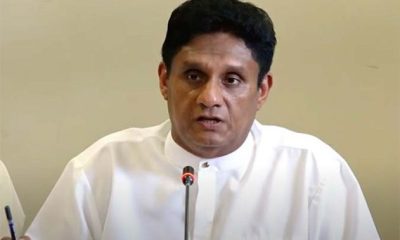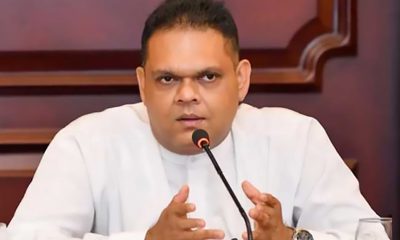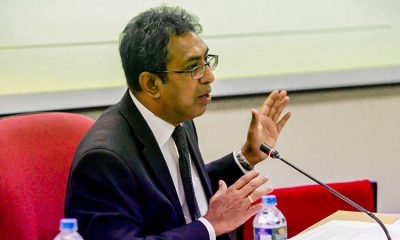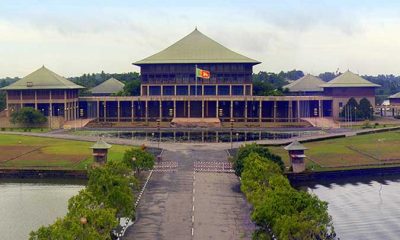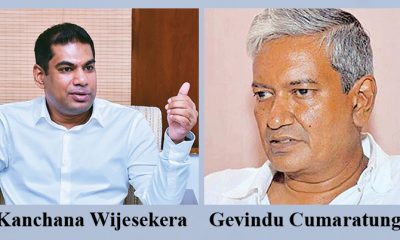Editorial
Welcome tax relief for elders

The Finance State Minister is reported to have said that the Government of Sri Lanka (GOSL) has decided to refund the five per cent withholding tax levy (WHT) deducted on the interest income of senior citizens after September 10 in case the interest income is less than Rs. 100,000 per month. He said this decision was taken with the Finance Minister, who is also the President, after considering the situation of senior citizens and the many requests to refund the WHT.
The State Minister also said, “We negotiated with the Inland Revenue Department (IRD) to refund the five per cent deducted as WHT for senior citizens, and accordingly, they agreed to refund the amount deducted from September 10.”
The decision by GOSL will undoubtedly bring some cheer to those who stand to receive the refund. By enforcing a five percent WHT at source, the GOSL collected taxes even from those not liable to income tax, assuming their total income for the year was less than Rs. 1.2 million.
We need further details on how the refund will be operationalized because getting any refund of taxes overpaid from the IRD has been historically nearly impossible. It is possible that the GOSL may ask the Banks who initially deducted the WHT to effect the refund to the senior citizens. In return, the banks will be either refunded this amount or allowed to set it off from future WHT to be remitted.
However, the State Minister or IRD must clarify an important question. How will the IRD or the Banks ascertain whether a senior citizen who claims a refund has multiple fixed deposits across banks where the monthly interest will exceed the threshold of Rs. 100,000 per month? It will be recalled that the President recently stated there are nearly 55 million fixed deposits amongst the population of 22 million.
Given that many within the 22 million don’t hold any fixed deposits, the probability of a person having multiple fixed deposits across more than one bank is relatively high.
Another problem that will be encountered is where interest is paid on FD’s maturity and where the tenor might be three, six months or twelve months. Who will monitor whether the cumulative interest for the year will be less than Rs 1.2 million and whether WHT should be refunded or not deducted? The State Minister did not say whether a senior citizen claiming a WHT refund should have a tax file opened at the IRD. If such a requirement exists, most senior citizens hoping for a quick refund will be disappointed.
An alternative would be to obtain a signed declaration from the deposit holder that his monthly income is less than Rs 100,000 or that his annual income is less than Rs. 1.2 million. This was the methodology used when the GOSL requested the Banks to pay an interest of 15% to senior citizens on a single deposit of Rs. 1.5 million. Whether there was widespread abuse, with senior citizens submitting multiple declarations to several banks and earning the enhanced interest rate, is unknown. However, many banks have complained that they are yet to receive the amount due to them from the GOSL.
The GOSL annual estimate for the collection of Income Tax was Rs 100 billion, of which Rs. 70 billion has been collected in the first six months. Therefore, it is reasonable to assume that the annual target will be well exceeded. As such, the GOSL can afford to extend some concessions to the senior citizens and those in the middle class with only salaried income who have been most affected by the new tax rates and reduced thresholds.
The Member of Parliament and Chairman of the Sectorial Oversight Committee has, over the last year, on several occasions disclosed some abysmal figures in terms of the number of tax files opened by individuals, the paltry amount paid by them as taxes and that of the 105,000 companies in the books only 15,000 pay any taxes.
He has also alluded that certain Inland Revenue, Customs and Excise Department officers are under performing in collecting taxes, and GOSL must restructure all three to achieve the goals in terms of tax collection. It will be interesting to know how many MPs have a tax file and how many file their annual returns and pay taxes.
Undoubtedly, the lack of digitization in the country is a severe drawback in many aspects, including collecting taxes and refunds due to taxpayers being processed. In most developed and developing countries, citizens need a tax file number when dealing with financial institutions. In Australia, when an individual fills out their electronic tax return, the box where bank interest income needs to be disclosed is already filled with the interest income earned from various banks. This is possible because the banks have submitted the relevant information to the tax authorities based on the tax file number of the deposit holder.
The importance of the country’s digitization can not be overemphasized, and the recent initiative by the GOSL to commence this with assistance from India is a step in the right direction. However, once again, a statement made by the Minister of Public Security that he will not allow a foreign company to have access to the blood group of our citizens indicates that there will be unnecessary delays based on unfounded concerns.
Editorial
Ensure safety of COPF Chairman

Saturday 8th June, 2024
It was with shock and dismay that we received the news about death threats to COPF (Committee on Public Finance) Chairman Dr. Harsha de Silva over the ongoing parliamentary probe into the on-arrival visa scam. Dr. de Silva yesterday told Speaker Mahinda Yapa Abeywardena, in Parliament, that he was facing death threats and intimidation, and it was incumbent upon Parliament to ensure his safety. He stopped short of naming names, but revealed that some ruling party MPs were among those who had ganged up against him. The Speaker only said there had been no complaint, and he would look into the matter.
The SLPP-UNP government has been doing everything in its power to have all parliamentary committees under its thumb. The COPE (Committee on Public Enterprises), which once helped restore public faith in the legislature by exposing state sector corruption, has now become a mere appendage of the incumbent regime, thanks to the appointment of SLPP MP Rohitha Abeygunawardena as its Chairman. The SLPP-UNP combine also tried to oust COPF Chairman Dr. de Silva, but in vain. However, it knows more than one way to shoe a horse.
The COPF, under Dr. de Silva’s chairmanship, has been a thorn in the side of the government, which is struggling to cover up numerous corrupt deals. Dr. de Silva yesterday told Parliament that he found it extremely difficult to function as the COPF head due to severe resource constraints his committee was facing; he himself had to pay the salaries of some of his staff members besides burning the midnight oil.
The sheer workload he had to cope with as the COPF chief had taken its toll on his health, he said, informing the Speaker that he was at the end of his tether, and at times thought of resigning from the COPF. This is exactly what the government wants him to do; resource squeezes and threats are aimed at making him quit.
On 26 May, Dr. de Silva revealed, in an ‘X’ post, that the COPF had uncovered some vital information about the visa scam and it would reveal everything after its final meeting on the issue; the COPF was committed to exposing the truth behind the controversial tender, he added. In an editorial comment on 27 May, we warned him.
While thanking him for his bold stand, we pointed out that by making such a statement, he had thrown caution to the wind, and become a marked target, with the government making an all-out effort to delay the COPF investigation lest the truth should come out much to the detriment of its interests in this election year. Unfortunately, what was feared has come about; Dr. de Silva is complaining of death threats and government moves to strangulate the COPF financially to derail its investigations.
Dr. de Silva’s predicament exemplifies the fate that befalls the few good men and women in Parliament. It is hoped that all those who seek an end to the state sector corruption will rally behind Dr. de Silva, and bring pressure to bear on the government to ensure his safety. Let Dr. de Silva be urged to reveal the names of those who have issued threats, veiled or otherwise, to him and are trying to scuttle the COPF probes.
Editorial
Dead man walking!

Friday 7th June, 2024
The SLPP-UNP government is going hell for leather to make bad laws as if there were no tomorrow. It is abusing its parliamentary majority, which has been retained with the help of some crossovers, for that purpose. The Opposition, the media and trade unions are up in arms, and understandably so. The incumbent regime is a dead man walking; it is so desperate that it is capable of anything. Hence the need for it to be restrained.
The Electricity (Amendment) Bill (EAB) plunged Parliament into turmoil yesterday, but the government secured its passage. The Supreme Court (SC) determined the entire EAB inconsistent with the Constitution and recommended changes thereto. After unveiling the Bill, sometime ago, Minister of Power and Energy Kanchana Wijesekera hailed it as an excellent piece of legislation aimed at straightening up the power sector to serve the public interest better.
The SC determination left him with egg on his face. He reminded us of the proverbial curate who, while eating a stale egg, assured his host, a Bishop, that parts of it were excellent. Wijesekera’s egg, as it were, made Parliament stink yesterday, but he sought to please his masters by praising it as a silver bullet.
EAB should have been discarded and a new one drafted in consultation with all stakeholders. But the government is apparently driven by an ulterior motive; its aim is not to serve Sri Lanka’s interests but to look after those of some moneybags.
It is not uncommon for Bills to contain some flaws, which are rectified either before or during the committee stage. But there is something terribly wrong with draft Bills that are full of sections inconsistent with the Constitution. The drafters of EAB have demonstrated their sheer ignorance of the supreme law, and that they are not equal to the task of drafting Bills. If they had read the Constitution at least perfunctorily, they would not have drafted such a bad law.
Ignorant and incompetent, they do not deserve to be paid with public funds and must be sent back to law school. They must be summoned before Parliament and questioned on their serious lapses, which have caused public faith in the national legislature to diminish.
Curiously, the MPs who demand that judges, doctors, Central Bankers, and other public officials be summoned before Parliament have taken badly drafted Bills for granted. The power sector trade unions yesterday alleged that EAB was of Indian origin and geared towards furthering the interests of Adani Group at the expense of Sri Lanka.
Most critics of EAB are agreeable in principle to the need for power sector reforms; the Ceylon Electricity Board should be given a radical shake-up, and transformed into a modern organisation capable of providing a better service at a lower cost. They only asked the government to tread cautiously, consulting all stakeholders and taking action to ensure that the country’s interests prevailed over everything else. But the government was in a mighty hurry to steamroller the Bill through Parliament, making the Opposition ask whether it was doing so at the behest of some external forces involved in controversial power generation deals here.
What is passed by the current Parliament can be either amended or abolished by a future parliament in a constitutionally prescribed manner. But that does not mean that a government is free to pass bad laws, making the country enter into long-term agreements with powerful nations and their investors. It looks as if the SLPP-UNP regime did not care two hoots about the consequences of its actions.
Editorial
Modi Magic on the wane

Thursday 6th June, 2024
The outcome of India’s parliamentary election (2024) has led to a ‘perspective ambiguity’. Prime Minister Narendra Modi lost no time in declaring victory for the BJP-led NDA alliance, which secured 293 seats in the 543-member Parliament, but he must be a worried man. The BJP is short of 32 seats to form a government under its own steam; it has lost 63 seats or about 20% of its parliamentary strength. It had 303 seats in the previous Parliament, and that number has dropped to 240.
Modi has become the second Indian Prime Minister to win a third term. The first PM to do so was Jawaharlal Nehru. But Nehru won an outright majority in Parliament in 1962; Modi has had to depend on smaller parties in his alliance to retain his hold on power. Modi must be reeling from a sharp drop in his victory margin in his own constituency, Varanasi; it has decreased to 152,000 from 480,000 in 2019 whereas Modi’s bete noire, Rahul Gandhi, won Raebareli by a staggering 390,000 votes.
Modi, who reigned supreme with 303 seats in the previous Parliament, is now dependent on parties such as Nitish Kumar’s JD-U and Chandrababu Naidu’s TDP to form a government. He has had to lead an alliance of strange bedfellows. Both Kumar and Naidu were bitter critics of Modi. Kumar helped form the oppositional alliance, the INDIA bloc, before switching his allegiance to PM Modi. Naidu also closed ranks with the BJP in the run-up to the election. These politicians have been described as extremely ambitious and highly unpredictable, and whether Modi will be able to manage them and consolidate his grip on the NDA alliance remains to be seen. They will demand plum ministerial posts in return for their support. The TDP is said to be eyeing Transport and Health portfolios! That is the name of the game in coalition politics, where it is not uncommon for the tail to wag the dog, so to speak. These two political leaders are however not the only problem Modi will have to contend with. The next five years will feel like an eternity for PM Modi.
Nothing would have been more shocking for the BJP than its defeat in Uttar Pradesh’s Faizabad constituency, where the Ram Mandir has been built. Modi may have thought he would be able to win the Lok Sabha election hands down after the consecration of that temple, which became a centrepiece of the BJP’s election campaign. The BJP lost that seat to the Samajwadi Party! Modi must be disappointed that the Ram Mandir hype failed to trigger a massive wave of support for his party. This particular defeat signifies a massive setback for the BJP’s ethno-religious agenda.
Modi’s divisive election campaign failed to yield the desired result. The BJP’s failure to secure an outright majority could be attributed to a host of factors, some of them being the suppression of the Opposition, the arrogance of power, chronic unemployment, and the rising cost of living. The BJP also did not care to reimage itself in a positive light to attract the youth.
Modi will hereafter see the Congress-led INDIA bloc with 223 seats, in his rearview mirror. The Congress (99 seats) and its allies have eaten into the BJP support base considerably, but they have a long way to go before being able to capture power.
The bumpy ride ahead for the BJP-led coalition government to be formed may improve the INDIA bloc’s chances of bettering their electoral performance and turning the tables on the BJP and its allies in time to come. Modi will have a lot to worry about in his third term.


